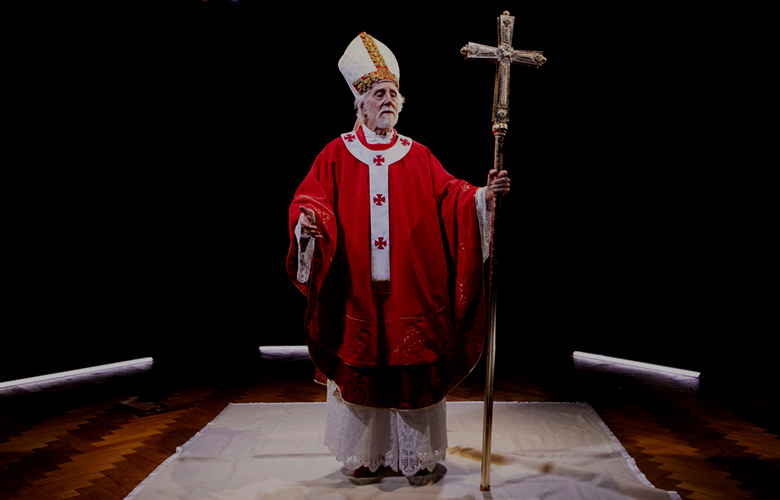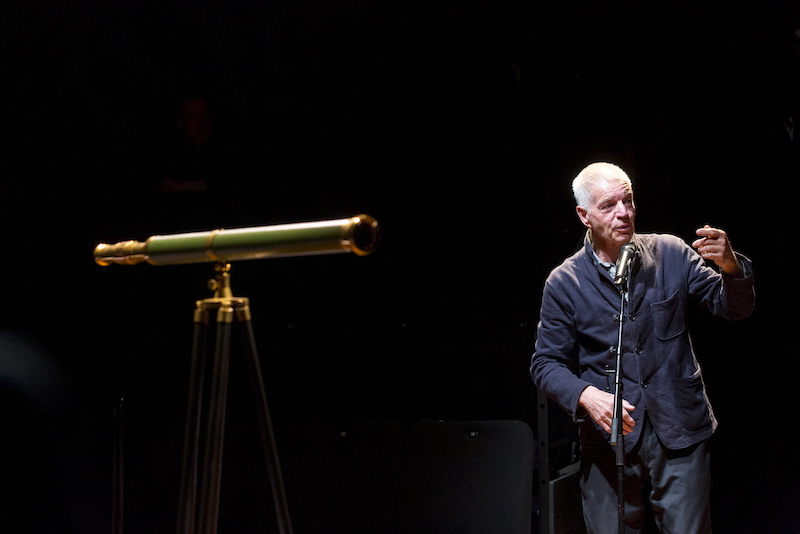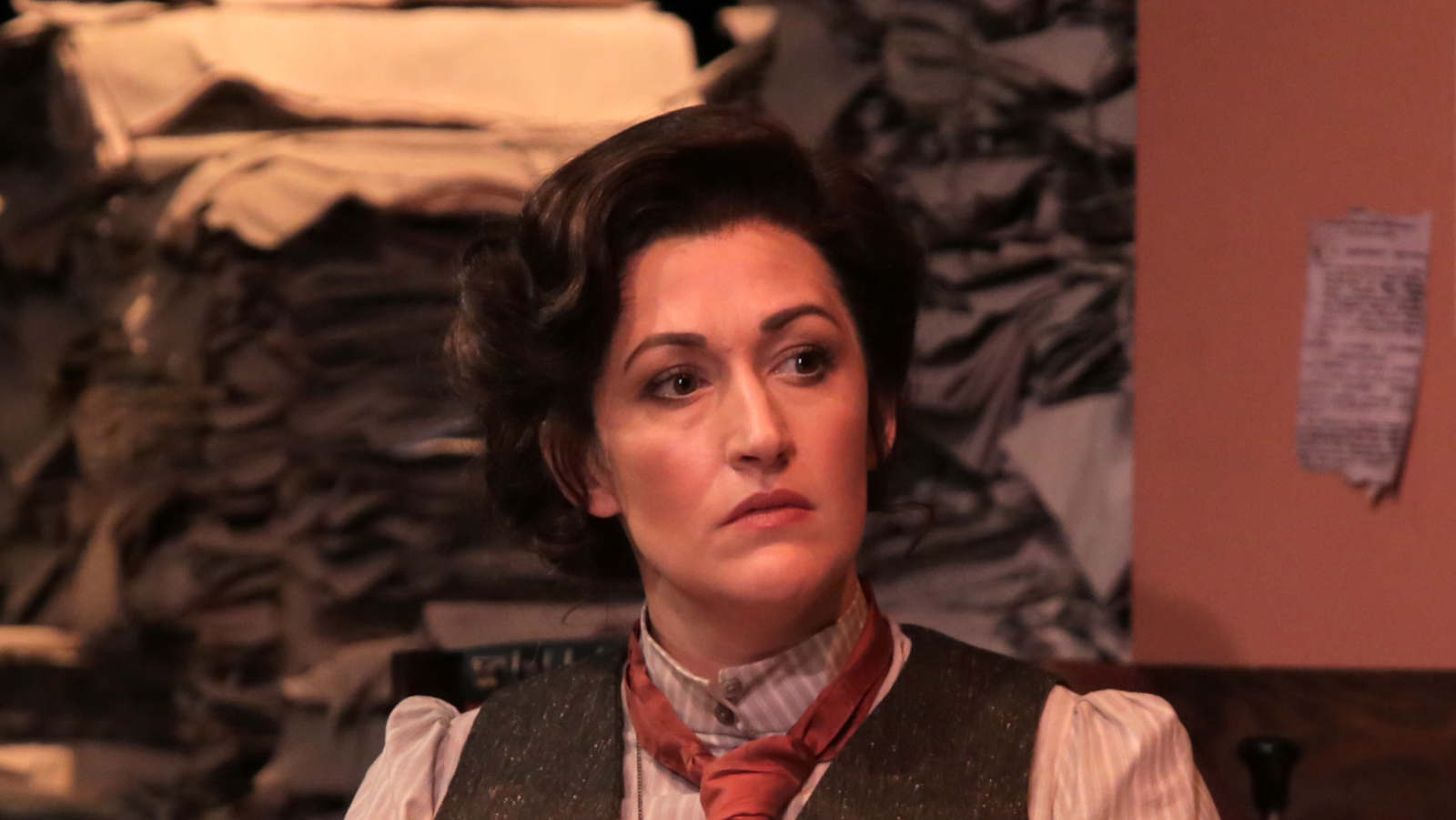
Interviews with Eamon Flack of Belvoir and Clare Watson of Sydney Theatre Company.
“We’re walking backwards to mystery across the rising seas.” That’s my reworking of Australia’s Spike Milligan’s Goon Show quip. Recent Australian productions of the theatre classics point out that the world is doing just that: walking into the unknown future with past strategies that are highly unlikely to solve the climate crisis.
Belvoir purposely selected The Life of Galileo to highlight the inability of humankind to address the climate crisis. The play by Bertolt Brecht and adapted for Belvoir by Tom Wright speaks directly to today’s crisis of inaction. Fear, superstition and the power of a small elite meant in Galileo’s time, that society continued to believe the sun rotated around the sun, despite clear evidence to the converse. And today fear, superstition and the power of a small elite mean some still believe the sun will continue to be our friend despite clear evidence to the converse.
Eamon Flack, director of The Life of Galileo, was good enough to answer my interview questions, leaving little doubt as to his views:
We definitely chose The Life of Galileo because it deals with the same set of questions we are dealing with now with climate change: What is the life-cycle of a fact? How does power turn truth to its own advantage? What is the human cost of changing our habitual view of the world? How do we change our minds? Why do we choose lies over truth? To what end are we working?
Brecht is very clear in his play that the Church is simply a stand-in for power. The modern thought police don’t wear robes and burn their targets to death, they wear lanyards and pillory their opponents in the press, on TV, online. But we shouldn’t be naïve about this: the effort to deny climate science and destroy any basis for action is not just habit or neglect, it’s a very active, very savage movement. That’s Brecht’s lesson. The lie of the status quo is not a casual attachment to a comfortable truth, it is a rich, powerful, ferocious enterprise of vested interests.

Belvoir is not a human agent and has no opinion, but I put all my stock in the scientific consensus, as do the critical-minded artists we work with. One thing an artist should be is a human and citizen above all else. There is a habit for an artist to be a personal brand. But human and citizen must come first. That is very true of Belvoir. But it is very difficult to make theatre that is directly about the climate crisis.
There are technical and dramaturgical reasons for this but really there is a big problem of imagination in the climate crisis: how do we know it? How do we come to have a lived understanding of it? People vote and take action based on things they have an innate sense of – their hip pocket, their stomachs, their family. How do we develop an innate sense of the climate crisis? It’s very difficult. What are its symbols? What are its forms? What is its human drama? How do we dream about it?
It’s such a big, incipient, mathematical thing that it’s hard to take it in imaginatively. But I guess that only makes the job of the arts all the more important in the long term. Because if we can’t begin to develop a lived sense of it, then we won’t learn to take action.
I think the Australian arts community is in itself a kind of enactment of the sort of ecological collapse that we’ll see with climate change. Which is to say, the arts in Australia have been so battered, stripped, neglected and undone by bad policy that it’s in a crisis of its own. The question of the climate crisis is very much taking a back-seat to the question of how the arts can assert its own value at all. So the focus here is very much on questions of community, identity, belonging, power. The assertion of a social value for the arts. Whether that’s the best way to go I don’t know yet. Social function is vital, but best thing the arts can do is enlarge our imagination.
I would argue arts will never have a direct impact on the world. It works through the imagination, through our understanding of our anxieties, fears, through the accumulation of new forms, the remaking of language, the absorbing of change… So in that sense I think the arts community can only have an indirect impact on promoting action. Our task is to try to give our minds a way to see and know what is going on. To try to turn mathematical ideas into felt human forms. So I think the biggest contribution we can make at the moment is through the underlying themes, rather than directly tackling of the ecological impacts.
Ideas of truth, of delusion, of how power dictates reality, of how to imagine a future, of what our yearnings are – the great old how to live questions – these sorts of things are where we can take part in the effort. I’m not hopeful. I think there is something about the nature of this crisis that is not just beyond the structures of modern capitalism to cope with, I feel like it is also unnaturally beyond the capacity of our imagination as a species… But I hope I’m wrong.
Sydney Theatre Company – Black Swan State Theatre Company’s production of The Torrents, a revival of Oriel Gray’s 1955 play set in the 1890s mining town of Koolgalla, has the same message… people cannot accept change even in the face of disaster. Despite evidence the gold is running out, the town continues to believe there is nothing to worry about. Somehow gold will again make the town prosper. The new ideas of abandoning mining for farming is rejected by the town fathers. And I write ‘fathers’ because in the nineteenth century woman had little say. The play’s parallel story is that of the town newspaper hiring journalist J.G. Milford, who turns out to be Jenny Milford, much to the proprietor’s shock, an intelligent woman. Without making a fuss, Jenny eventually steers the community into accepting a new paradigm to save the town. But it’s been a battle.
I sat in the theatre seeing the direct connection between the 1890s mining town and the inability of Australian government’s fathers to transition us out of being a mining country.
Clare Watson, Director of The Torrents, was also kind enough to respond to my questions:
Oriel Gray’s play written in 1955 speaks to so many pertinent contemporary concerns and crises including environmental issues. In particular, she focuses on the impact of mining and water scarcity. In The Torrents we meet the fearless and passionate Kingsley Myers, played by Luke Carroll; he has a dream of irrigating the goldfields and creating a fecund soil that will deliver far more sustenance than the gold being dug out of it ever could.
His vision was considered madness but slowly he brought his small community on board, which led to his ideas being published. The Torrents is a play about the power of an individual to unite a community to shift the status quo. The images that have circulated of Greta Thunberg’s solo school strike beside last Friday’s global strikes across the globe demonstrate the same power of an individual to affect change.
The Arts are at the vanguard of change – cultural, social and political – we relish this responsibility. Theatre can speak to a future that is more tolerant, more inclusive and more compassionate.
I sat with an artist recently who asked, ‘how can we just sit here and make a show while the Amazon is literally burning?’ I think most individuals have this anxiety of wanting to do more and to affect more change, our industry shares this anxiety. The work I’ve made and curated is unified by its intention to shift hierarchies, to challenge assumptions and reframe ideas of power and influence. And if this could be achieved on a global scale – if we listen to indigenous cultures about how to listen to the land and waterways, if we prioritise people over profit and if we recognise that children are the best teachers…we’re moving in a better direction. Is it enough? It’s better than less!
The other Australian classic that is revived every year somewhere in the country is Ray Lawler’s 1954 Summer of the 17th Doll. In this story of transition, the sugar workers who every year go to Queensland to cut cane, cannot accept the change to mechanisation. They continue to live as if nothing is ever going to change, to the detriment of all. It doesn’t take much imagination to transport the play’s dilemma to the here and now.

Judging from Eamon Flack’s and Clare Watson’s answers to my questions, Australian theatres are definitely doing their bit. Sydney’s revival of the classics might just jostle the Aussie ‘she’ll be right’ mantra. Will this jostle shift the fearful, the superstitious and the small elite who wield unequal power?
Congratulations to Belvoir and STC. My thanks to Eamon and Clare for their fine productions and for answering my questions.
Interview with Director Tuan Le: Nouveau Cirque du Vietnam
Has Netflix Homogenised Us? We Are All Watching The Same TV


Carol is a Sydney playwright, producer and artist. She has had four full-length plays and 14 short plays produced (Sydney, Malaysia, India). Her published plays are at australianplays.org. Reviews of her latest play are at www.kissofthegalleryguard.net.au/reviews. Her artwork is at www.paintingsbycaroldance.com
Read Full Profile© 2021 TheatreArtLife. All rights reserved.

Thank you so much for reading, but you have now reached your free article limit for this month.
Our contributors are currently writing more articles for you to enjoy.
To keep reading, all you have to do is become a subscriber and then you can read unlimited articles anytime.
Your investment will help us continue to ignite connections across the globe in live entertainment and build this community for industry professionals.